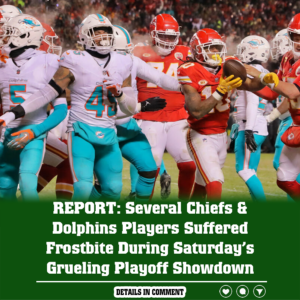Major players in the business community, including billionaires Elon Musk and Mark Cuban, have filed amicus briefs in support of a legal challenge to the SEC’s use of in-house judges to adjudicate enforcement proceedings.

News
Dave Crosby, the individual who captured the attention of all three Voice Judges in record time. Watch his incredible performance – it’s truly astonishing!
From the moment he graced the stage, it was evident that a remarkable performance was about to unfold. As Dave serenaded the room, a captivating melody filled…
Tom Brady Sparks New Dating Rumors After Being Spotted Out At Dinner With Popular Sideline Reporter
Tom Brady has set off another wave of dating speculation following his brief romance with Irina Shayk. According to TMZ, the former NFL star was spotted out in Beverly…
REPORT: Several Chiefs & Dolphins Players Suffered Frostbite During Saturday’s Grueling Playoff Showdown
Multiple players are said to have suffered frostbite during Saturday night’s playoff showdown between the Kansas City Chiefs and Miami Dolphins at Arrowhead Stadium. The game was the fourth-coldest in NFL…
Female Eagles Fan Unleashed All Sorts Of Cruel, NSFW Insults Towards Bucs Fans After Her Team’s Ugly Wild Card Loss In Tampa (VIDEO)
A female Eagles fan went off on Buccaneers supporters after having to sit through a frustrating Wild Card fixture in which her team put just nine points…
Female Eagles Fan Unleashed All Sorts Of Cruel, NSFW Insults Towards Bucs Fans After Her Team’s Ugly Wild Card Loss In Tampa (VIDEO)
A female Eagles fan went off on Buccaneers supporters after having to sit through a frustrating Wild Card fixture in which her team put just nine points…
Jalen Hurts Had An Interesting 7-Word Response After Being Asked If He Wants Nick Sirianni To Remain The Eagles’ Head Coach (VIDEO)
Jalen Hurts has taken an exit at the first opportunity as his Eagles are out of the playoffs following a season in which they raced to 10-1 before…
End of content
No more pages to load











